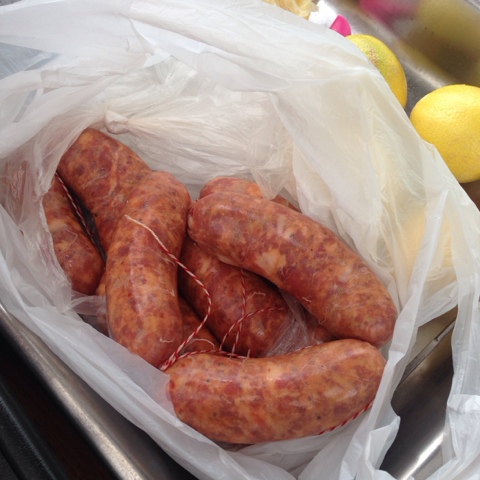This post is a couple of months late, but I wanted to post it anyway.
Greek Easter (Orthodox Easter) has always been one of my favorite times of the year. Not because I'm religious in any particular way, but just because it's a very laid-back occasion with a lot of really good food.
It's the only time of the year when having a spit roasted lamb (or occasionally goat) is guaranteed. And this year, because I've helped out a few friends with their spit roasted meats in the past, I really wanted to help my dad out with the lamb.
On the Saturday morning, dad picked up the lamb from the butcher. He seasoned the inside of the lamb with salt, pepper, oregano and rosemary and he then threaded some garlic cloves and two halves of a lemon onto a string and attached it to the inside of the lamb, so that it wouldn't fall out while the lamb rotated. He sewed up the lamb to keep everything inside and he let the lamb rest overnight on a table in the living room so that it was at room temperature for the next day's cooking.
Early on Sunday morning, I was at my mum and dad's house, and the weather wasn't looking good, so because we didn't want to put the spit up on the deck - taking up precious seating space for the 30 or so people who were coming for lunch - we took the spit out back and rigged up a tarp to keep the lamb sheltered from the rain.
Even with the cold weather, it didn't take long to get a few heat beads going, which we were using as a starter for the charcoal. As soon as it was hot enough, the lamb went on. The heat is concentrated more so on the shoulders and the legs, since there's more meat there and less on the loin.
The next step was getting the basting mix going. It's a very simple recipe: olive oil, lemon, salt, pepper and oregano. I'm pretty sure you could season any meat with that combo and it wouldn't be a wrong decision. The important part though, is that the basting brush must be made from a few branches of rosemary tied onto a stick with some wire. This is key!
Things that must be done throughout the day while the lamb cooks:
- The lamb must be basted constantly, especially if it doesn't need it.
- Loose bits of meat and skin must be picked off and eaten as they peel away from the bone.
- Ouzo, retsina and/or Greek beer are the only drinks allowed around the lamb.
- A couple of photos must be taken while basting the lamb.
The lamb takes a few hours to cook, and sitting around watching meat cook slowly for several hours is hard work, so dad got out some spicy pork sausages he'd bought from a Greek butcher, sandwiched them in a grill basket and cooked them over the charcoal.
After a few more drinks, and a little more meze, once the lamb finished cooking, it was time to bring it in and carve it up for lunch.
And then it was time to eat! Although the meat was the champion of the day, there was still a ton of food that had been prepared by everyone, including seafood, rice, pasta, vegetables, salads, breads, dips and much more. The sense of community is always alive.
Spit roasting meat is as much about the journey as it is about the destination. The way the meat is prepared, seasoned and basted is unique in each circle, which results in different tastes, and in the same way that watching a campfire burn is incredibly mesmerising, so is watching a lamb cook.
The spectacle of the thing is a great way to get people together, and there's rarely a person who doesn't want to come outside to see the meat cook. The spit also doubles as a heat source when winter has decided to rear its head early ;)









No comments:
Post a Comment